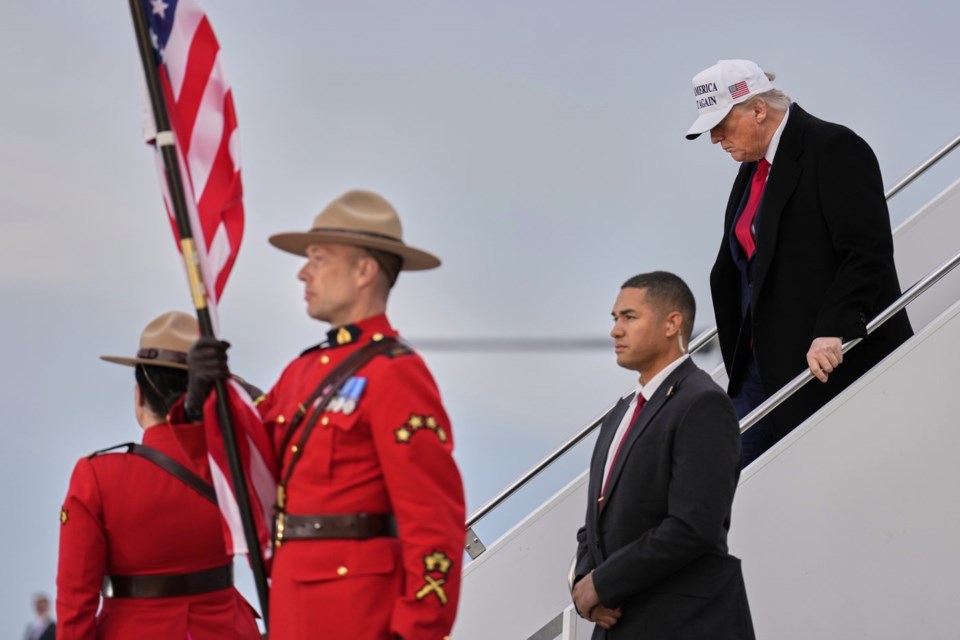KANANASKIS — The U.S. and Canada have agreed to reach a deal on a new economic and security relationship by mid-July, Prime Minister Mark Carney's office said Monday, following a meeting between Carney and U.S. President Donald Trump on the sidelines of the G7 leaders' summit in Alberta.
The news came despite Trump telling reporters in a photo op at the outset of that meeting that he and Carney have "different concepts" of what that deal might look like.
The two leaders met privately Monday morning at the G7 summit Carney is hosting in Kananaskis, Alta. Canadian officials initially described the meeting as a productive conversation about a possible trade deal and security partnership.
But Monday afternoon, Canada's formal summary of the morning meeting said the two leaders "agreed to pursue negotiations toward a deal within the coming 30 days."
The White House has been asked to confirm its understanding of what the leaders agreed to.
The two met after weeks of exchanging phone calls and text messages in an ongoing attempt to resolve the economic conflict triggered by Trump's tariffs. The president confirmed the meeting would largely surround trade.
"I'm sure we can work something out," Trump told reporters.
"I'm a tariff person. I've always been a tariff (person). It's simple, it's easy, it's precise and it just goes very quickly, and I think Mark has a more complex idea, but also very good," Trump said.
In brief remarks, Carney welcomed Trump to the G7 and wished him a happy birthday. The president turned 79 on Saturday.
"This marks the 50th birthday of the G7," Carney said. "And the G7 is nothing without U.S. leadership."
Following their one-on-one meeting, Trump and Carney sat down with a wider group that included Intergovernmental Affairs Minister Dominic LeBlanc, U.S. Treasury Secretary Scott Bessent and U.S. Trade Representative Jamieson Greer.
In an afternoon press conference, LeBlanc and Kirsten Hillman, Canada's ambassador to the U.S., said talks with their American counterparts have accelerated in recent weeks.
LeBlanc said both countries have agreed to keep the details of those talks private and to reconvene before the end of the week.
"The important thing is that we collectively think we're making progress in coming to a deal that would be in the economic interest of both countries, but we're not there yet," he said.
Hillman said she has a sense that the Americans are "understanding us better" as Canadian officials call for all the tariffs to be removed.
"We have a president who is very convinced of the policy that he has around tariffs in order to achieve some of his policy goals," she said.
"We are very convinced that applying that policy to Canada is actually detrimental to his overall goals, and we are trying to get there with him and his officials."
Hillman and LeBlanc did not answer repeated questions about whether Trump again raised the idea of making Canada a U.S. state during the conversation.
Trump spent some of his time in front of reporters Monday morning railing against former prime minister Justin Trudeau and former U.S. president Barack Obama, blaming them both for the decision to eject Russia from what was then known as the G8 in 2014.
Trudeau was first elected prime minister in 2015. Stephen Harper was prime minister when Russia was ousted from the G8 after annexing Crimea.
"Barack Obama and a person named Trudeau didn't want to have Russia in, and I would say that that was a mistake, because I think you wouldn't have a war right now if you had Russia in," he said, referring to Russia's 2022 full-scale invasion of Ukraine.
Trump and Trudeau had a notoriously poor relationship.
Trump stormed out of the last G7 summit that Canada hosted in 2018, pulled out of a joint leaders' statement and issued a statement of his own calling Trudeau weak and dishonest.
On Monday, Trump said he and Carney have "a very good relationship."
Carney's formal summary of the meeting also said the leaders discussed themes of the ongoing G7 summit, including critical minerals and defence, border security and gun and drug smuggling.
The war in Ukraine is one of Canada's top priorities as host of this summit.
Carney invited Ukrainian President Volodymyr Zelenskyy to attend, along with a handful of other world leaders who are not part of the G7.
The summit is also taking place as violence escalates between Israel and Iran.
Carney's office confirmed talks took place Monday at the summit on a possible statement on Israel and Iran, but would not discuss the nature of the discussions.
American media outlets, including CNN, reported that Trump pushed back on signing such a statement. The Canadian Press could not confirm that report.
Stefan Kornelius, a spokesperson for the German government, told media at the summit that Trump and German Chancellor Friedrich Merz spoke about the Middle East.
On the potential for a joint statement on the Middle East, he said "the goal might be to have a joint declaration by the G7 here, because that would serve a purpose that would unfold some impact."
"We'll see in the end, it'll be up to the American side to decide whether we're going to have a G7 statement on the Middle East or not," he said.
The summit officially began Monday. Following a welcome ceremony, Carney noted that while G7 countries don't always agree, they still face shared threats in an increasingly dangerous world.
"Nostalgia isn't a strategy," Carney said in his opening statement to a roundtable of G7 members.
"We will have open, frank discussions over the course of the next two days. We might not agree on absolutely every issue, but where we will co-operate, we will make an enormous difference," he said.
— With files from Sarah Ritchie in Ottawa and Emilie Bergeron in Kananaskis
This report by The Canadian Press was first published June 16, 2025.
Dylan Robertson, The Canadian Press



